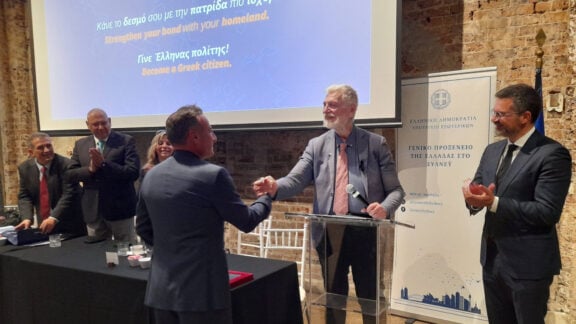The question “How can we mobilise Greek diaspora youth towards learning the Greek language?” was one of the most fundamental ones posed at the 11th International Greek Language and Culture ‘NOSTOS’ 2022 Conference held in Argentina between 31 October – 01 November, when presenting online the quantitative research findings on the Melbourne-Athens: A journey of Friendship educational pilot Program (2016-2018).
The conference, that was held at the University of Buenos Aires (Department of Economics) under the auspices of: the Greeks Abroad and Public Diplomacy General Secretariat and with the support of the Greek embassy in Buenos Aires, the Holy Metropolis of Buenos Aires, the Ministry of Culture in Argentina, the Cervantes National Theatre, the Department of Philosophy (University of Buenos Aires) and various other organisations for the support of the Greek language, attracted great interest and media attention.
Dr. Christina Tsardikos, President of the Greek Cultural Organisation ‘Nostos’ in Argentina, was the conference’s leading figure and driving force.
Deeply concerned around young peoples’ motivations when learning the Greek language, Dr Tsardikos invited speakers from all over the world. She also provided a unique opportunity to discuss the quantitative research results of the Melbourne-Athens: A journey of Friendship educational Program’s two-year pilot experience.
The research, that was conducted by me, between 2020-2021 for the purposes of a postgraduate degree MSc in Economics offered by the University of Piraeus, took place with the support of parents, educators, and Greek school principals in Melbourne. Its aim was reflect and reconsider the two year implementation of Melbourne-Athens: A journey of Friendship Program (2016-2018) online initiative in the post Covid-19 era. During its pilot phase, the program encouraged one-on-one semi structured interaction between peers who lived in Greece and spoke Greek as a native language (mentors) and Greek- Australian youth (mentees) to improve the latter oral communication skills.
The presentation of the postgraduate research results took place online creating space and opportunities for communication between the various representatives of Greek diaspora networks.
“To what extent can a one-on-one online mentoring programs encourage youth to learn the Geek language in the post Covid-19 era?”, “What kind of features can make an one-on-one peer distance learning program attractive for youth?” and “What kind of factors can discourage them youth from selecting such initiative?”, were only a few of questions discussed at the ‘Nostos’ 2022 Conference, since social interaction research indicated it appears that a combination of technology and one-on-one makes a difference to Greek diaspora youth.
Having argued that, it is important to acknowledge that according to the postgraduate research findings of 2020-2021, a post pandemic online one-on-one mentoring program would have to incorporate elements of asynchronous communication, alongside the synchronous one-on-one interaction among peers since young people desire multiple stimuli to engage effectively.

At the same time, a post pandemic version of the Melbourne-Athens: A journey of Friendship program would also have to align with the National Curriculums of the students’ hosting and receiving country. Only in that way, will such an initiative address the needs of the youth involved and embrace the Greek Australian identity.
Educators involved in the design of educational programs need to avoid ethnocentric approaches that reproduce diaspora students’ identities in one dimensional ways. A post pandemic online version would also need to include activities geared differently when addressing newcomers’ learning needs and third generation diaspora needs.
The idea that a post Covid- 19 version of an online one-on-one youth mentoring program for the Greek language should foresee opportunities for youth to co-design activities was also presented at the 11th International Greek Language and Culture Conference ‘Nostos’ 2022.
Research findings indicated that when students co-design educational resources they feel more engaged and motivated to “take a program’s ownership”.
At the same time, a bilingual version of the program – via the reversion of the mentor- mentee role- was also discussed during the conference to motive students. According to my research findings Greek Australian youth would feel more motived when they have opportunities to communicate in both languages with a peer.
Having both roles i.e. the mentee’s role when they practice Greek as a second language and the mentor’s role by teaching English to their counterpart, will allow then to develop their dual identity and team work skills. At the same time, it will benefit greatly the students from Greece. Greek parents perceive foreign language learning in Greece as a very important asset by investing an important amount of money annually. In spite of that, their children have limited opportunities to converse in an educative environment with a peer from abroad.
Consequently, many Greek youth score low in the sections of speaking & listening when undertaking language diplomas. Thus, by reversing the roles all youth will benefit greatly.
Youth may also feel more motivated towards a post pandemic version of an online one-on-one Greek language program, if their parents participate more actively in the initiative by getting involved in the preparation of the one-on-one semi structured sessions.
Lockdown allowed parents to become more aware around technology and their children’s education. Consequently, parents can use that knowledge.
Diaspora youth may also feel more encouraged towards participating in a future online one-on-one peer mentoring program if entry criteria are flexible.
Qualitative interviews demonstrated that some Greek Australian diaspora students take private lessons and do not necessarily attend Greek schooling. Since they are highly motivated, participants supported that it is important to allow them access to such a program, whether youth are registered in a Greek language school or not.
According to one interviewer “Greek diaspora youth have started selecting ‘a la carte‘ models for Greek language learning since those allows them to create their own paths and it is important to acknowledge it”.
Τhe 11th International Greek Conference ‘Nostos’ 2022 in Argentina was an opportunity to highlight issues that concern the Greek diaspora youth by acknowledging the similar challenges and by recognising the vital importance of diaspora networks in the development of Greek studies.
*Maria Filio Tridimas is a sociologist and educator.







